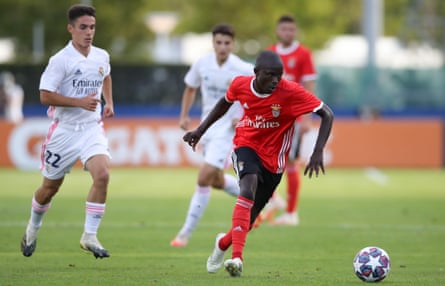Jack Charlton led the Republic of Ireland from international also-rans to the World Cup quarter-finals. When appointed manager of the national team in the late 1980s, he cast the net for players far and wide, searching through genealogies and tracking down anybody with Irish roots. It was a controversial approach, but it worked. Fast forward thirty-odd years and another Jack C is undertaking similar searches, but this time on behalf Guinea-Bissau. For a country with a population of just two million, the need to expand the pool of players is understandable. This is where Jack Coles plays a crucial role.
Coles, who worked as a recruitment analyst at Leicester for four years before taking over as head of data analysis at Coventry City, discovered that Guinea-Bissau were missing out on footballers while playing a computer game. “While playing Football Manager , I became aware of the facility to switch players from one country to a different nation,” he says. “Initially I looked into the links between Curaçao and the Netherlands and soon realised that there were plenty of players who had dual nationality.”
His interest was piqued and he wondered which country could benefit most from their diaspora. Coles identified Guinea-Bissau as the country with the widest difference between its own world ranking – which is currently 106 – and the countries that it could potentially draw players from, such as Portugal, Spain and France, who are all in the top 10.
He tracked down Guinea-Bissau’s technical director via LinkedIn and offered his services on a voluntary basis. Although the president of the federation was initially sceptical about why an Englishman working for a Championship club would want to help them for free, he gave the go-ahead after Coles sent his proposal.

Jack Coles has volunteered his services to Guinea-Bissau. Photograph: Jack Coles
“The idea of offering help to a nation who were low on the Fifa rankings and who could benefit from exploring the dual nationality route was born,” Coles says. Guinea-Bissau have qualified for the last four Africa Cup of Nations, having missed the previous 30 tournaments, so there is talent among the nation’s footballers. Coles hopes to build on the foundations of their recent success. A change in the rules has also helped, paving the way for more players to switch their allegiances. Footballers can now switch nationalities if they have played no more than three competitive matches (not including games at major tournaments) at senior level before turning 21.
Discovering players via Football Manager is not a novel concept. The game played a role in Ben Brereton Díaz’s ascent from the Championship to the Chile national team. After he revealed in Blackburn’s match programme that his mother was born in Chile and had moved to England with her parents when she was a teenager, his Chilean heritage was included in his profile on Football Manager. His excellent goalscoring form for Blackburn drew the attention of Chile fans and, subsequently, the national team. Brereton Díaz was included in the country’s squad for the Copa América in 2021, making his debut against Argentina.
Tracking down players often starts with Coles trawling through databases and then approaching them, sometimes through LinkedIn, either directly to the players or through their agents. It is a laborious process and players can take some convincing. Coles has encountered resistance from agents. “I had tried to contact one player in particular via his agent but was getting no response,” Coles says. “Then the player switched agents and through the new agent I got to speak to the player, who told me that his old agent hadn’t passed on any of my messages.”
It can be difficult to persuade players to switch as they are wary of the low ranking of the country and possible risk to their reputation. There can also be reluctance to join training camps as the facilities are relatively limited, with players worried about getting injured and not receiving the best treatment, which could ultimately affect their club careers. Over time the work has become easier though – once a few players committed, there was what Coles describes as a “snowball effect”, making it easier to persuade others to join.

Ronaldo Camará playing for Benfica against Real Madrid in the Uefa Youth League final. Photograph: Sportimage Ltd/Alamy
Coles cites Carlos Mané as one of his most successful discoveries. Mané was born in Lisbon, spent most of his early career at Sporting and represented Portugal through every age group, from Under-15s to Under-23s, amassing more than 70 appearances for the country of his birth. He even represented them at the Olympics in 2016 alongside Bruno Fernandes. Unlike the Manchester United captain, Mané did not graduate to the Portugal senior team. Instead, he was coaxed into playing for Guinea-Bissau, making his debut at the age of 29 last month against Sierra Leone in an Afcon qualifier.
Mané was one of eight debutants in that match, with Coles playing his part in the influx. He introduced players such as 20-year Ronaldo Camará, who like Mané had represented Portugal at various age groups, and Houboulang Mendes, who plays for UD Almería in La Liga. Coles has several higher-profile players on his radar, including Everton’s new signing Beto and the Ajax winger Carlos Forbs.
Guinea-Bissau will always face tough odds in international football given the size of the country and the trend of players born in Africa declaring for European countries. Ansu Fati, who is on loan at Brighton from Barcelona, was born in Guinea-Bissau but chose to play for Spain, where he moved as a child. His father had left for Europe to find work to support his family before Fati was born, so he met him for the first time when he arrived in Spain. Fati played for Herrera and Sevilla before following in his elder brother’s footsteps and joining Barcelona’s academy in 2012. He now has nine caps for Spain.
In a similar move – and one that would please Charlton – Chiedozie Ogbene has become the first African-born player to represent the Republic of Ireland. The Luton Town winger was born in Nigeria before moving to Cork with his family when he was eight years old. Considering the current state of the Irish team, who have dropped to 55th in the world rankings, they might consider harnessing Coles’ expertise to help them revive the team and relive the glory days they enjoyed under the other Jack C.



